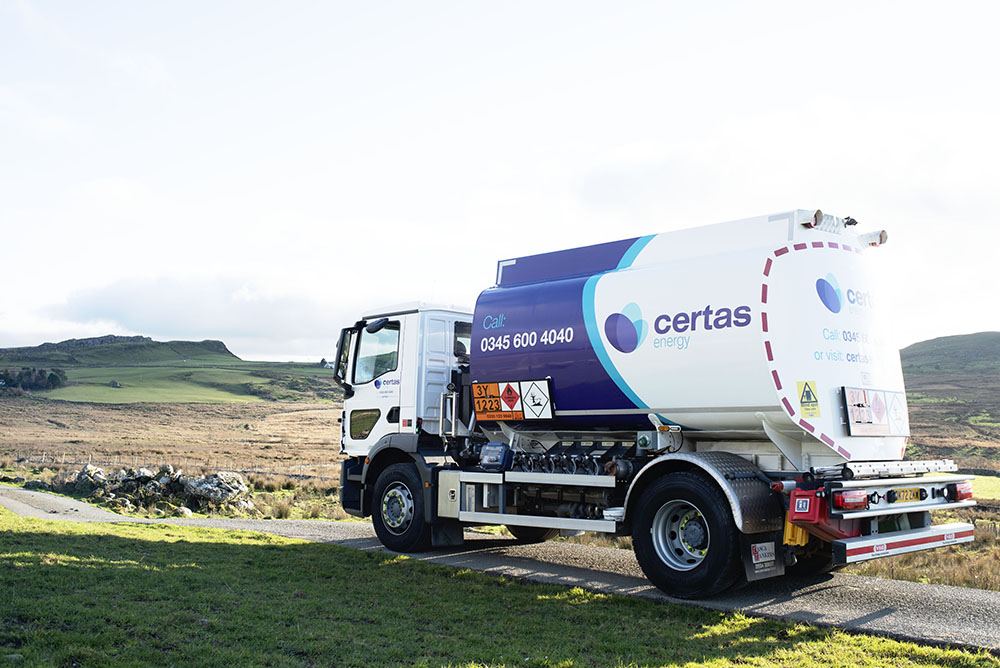Important Notice: Gas oil tax legislation changed on 1 April 2022. Please see the latest Certas Energy statement for a summary of the updated gas oil tax legislation and its impact on industries.
Welcome to Certas Energy’s guide to gas oil (red diesel). Here you’ll find out everything you need to know about the rebated fuel: from what it is and how it’s made, to who can use it and the latest regulatory updates.
What is gas oil?
Gas oil is a fossil-derived fuel which results from the fractional distillation of crude oil. It is heavily rebated and used for heating and back-up power generation, as well as some off-road applications. It is designed to help industries that need a cheaper fuel for work-related purposes, but its use has become restricted to mostly non-commercial purposes since new duty equalisation legislation was introduced in April 2022.
Is gas oil known by any other name?
Gas oil is also commonly known as red diesel, owing to the red dye that is added. It is sometimes also referred to as cherry juice, tractor diesel, agricultural diesel and 35 second oil. Its properties are broadly similar to road diesel, with the red dye distinguishing it from clear-coloured road diesel. The use of gas oil in road vehicles and commercial off-road vehicles and machinery is strictly prohibited by HMRC, with considerable fines for non-compliant usage.
How is gas oil made?
Like many forms of fuel, gas oil is derived from crude oil that has been extracted from the ground. The crude oil is pumped out from below the earth’s surface to produce a thick, black liquid commonly known as petroleum. Through the process of distillation, crude oil transforms into a variety of fuels, depending on how it is distilled.
The lightest of these components will rise to the topmost part, while the heaviest settle at the bottom, which is how crude oil is transformed into gasoline, kerosene, and finally diesel. The ‘leftovers’ is what gas oil is made from.
The refining process of red diesel does not differ greatly from road diesel. The red dye is added to the final product to give it its distinct colour and make it easily recognisable against colourless road diesel. The red dye alerts HMRC inspectors to any misuse of the off-road fuel.
What is gas oil used for?
Gas oil is designed to support fuel users that need a relatively inexpensive source of fuel for specific off-road operations. Since the introduction of duty equalisation in April 2022, users of red diesel are limited to:
- Travelling fairs and circuses
- Fuel used for non-commercial purposes – electricity generation and heating
- Agriculture, horticulture, fish farming and forestry
- Rail transport
- Community amateur sport clubs and golf courses
- Sailing, boating and marine transport (excluding private pleasure craft in Northern Ireland)
As it is a ‘rebated fuel’, gas oil has a lower fuel duty than regular road diesel and, as such, can only be legally used by certain industries in specific circumstances. For more information on who is affected by red diesel reform and how, visit the Beyond Red Diesel section of our website.

Are there any regulations to be aware of?
Yes – as gas oil is a rebated fuel and offers cost savings on fuel duty, its use is stringently regulated and it is clearly stipulated that gas oil is only to be used for specific purposes and industries.
Gas oil must not be used in any non-permitted vehicle or machinery and to use it in such a way is a criminal offence. Some farm vehicles are able to use gas oil when travelling on public roads between farms, but the distance must not exceed 1.5km and both pieces of land must be owned by the same person. Additionally, vehicles used to grit roads in icy conditions are permitted to use gas oil whilst carrying out the gritting.
Industries that traditionally relied on red diesel cannot use the rebated fuel, including the construction sector. Heavy plant and equipment of all kinds, including NRMM (non-road mobile machinery), can no longer run on gas oil when used for commercial purposes.
Other industries and applications impacted by the red diesel law changes include leisure, manufacturing, mining and quarrying, oil and gas extraction, road maintenance, airport and seaport operations, plant hire, logistics and waste management, any commercial heating, and haulage—refrigeration units on HGVs are also prohibited from running on red diesel. Agricultural vehicles, however, are exempt from the rule changes, and can continue using red diesel as before, as long as they use it in accordance with the updated law.
If your business is no longer permitted to use red diesel reform – or if you would like to explore cleaner fuels – check out our guide to alternative fuel options.
Gas oil or road diesel?
Whilst gas oil and road diesel are primarily the same type of fuel, road diesel does have a slightly higher cetane rating and can be more efficient for road vehicles. Both fuels can be used in the same way but, as explained, gas oil can only be used in accordance with government legislation. Using gas oil as an alternative to road diesel outside of the regulations is subject to significant fines.
As well as standard white diesel/DERV, there are cleaner diesel alternatives that are becoming increasingly available, including OEM approved fuel, GTL Fuel (Gas-to-Liquid), and renewable diesel Hydrotreated Vegetable Oil (HVO), (dependent on usage, duty may still apply). Both fuels can help lower emissions and accelerate businesses’ net zero ambitions.
What is the difference between kerosene and gas oil?
Gas oil and kerosene are both commonly used as heating solutions but gas oil is no longer permitted to be used for commercial heating purposes, following the legislative changes in April 2022.
Kerosene is a low viscosity oil that has a range of commercial uses. Also known as 28-second oil, paraffin or kero, this pale, yellow or clear fuel oil has a lower viscosity and lower freezing point than gas oil. It also has a longer shelf-life, making it a reliable oil for many industries.
Another cost-effective, highly-efficient and compliant alternative to gas oil is industrial heating oil or Therma35. It is ideal for use in commercial boilers, heaters, driers and furnaces and requires no equipment modifications. It also offers a long storage life so it can be bought and stored in bulk.
How much does red diesel cost per litre?
The price of red diesel changes daily due to influences from the global oil market. Prices can also depend on quantity and location, so the price of red diesel really depends on the order being placed and what’s currently happening in the market.
Ordering gas oil
If you are looking to order gas oil for your business, Certas Energy can deliver to your sites across the UK. Call your local team for further advice on 0345 600 4040 or request a quote online.
Why choose Certas for your gas oil?
Certas Energy is the UK’s largest independent distributor of liquid fuel, supplying businesses with reliable fuel deliveries across the UK from its national network of 130 depots. With the industry’s largest fleet of more than 900 tankers, your fuel delivery can be from 500 litres up to 36,000 litres in one drop. As well as providing an assured and reliable supply of high-quality gas oil, we can guarantee expert advice from our on-hand specialist, friendly and professional teams for all our customers’ commercial fuel needs.
Speak to Certas Energy today and find out more about our competitive gas oil services.

Common FAQs about gas oil
Do I have to pay tax on gas oil?
Whilst gas oil is a rebated fuel, fuel tax duty is still applied – albeit at a lower rate than white diesel/DERV/road diesel. Prices for gas oil are lower due to this lower fuel duty.
What is the EN590 standard?
The EN590 standard is the current emission standard, developed to reduce the sulphur content in diesel fuel. Fuels within this category are referred to as ‘ultra low sulphur fuels’ or ULSD (ultra low sulphur diesel) and gas oil fully complies with the EN590 standard.
What is the difference between gas and gas oil? ‘Gas’ is generally used as the shortened version of gasoline. Gasoline is essentially another term for petrol and is primarily used to fuel road vehicles. Gas oil is an ultra low sulphur fuel (ULSD) alternative and can be used only in accordance with UK legislation.







